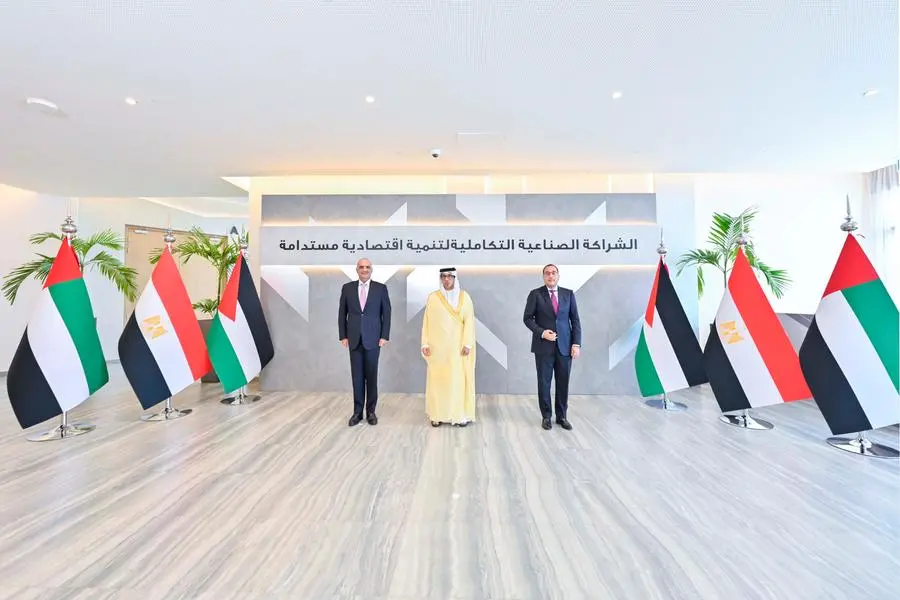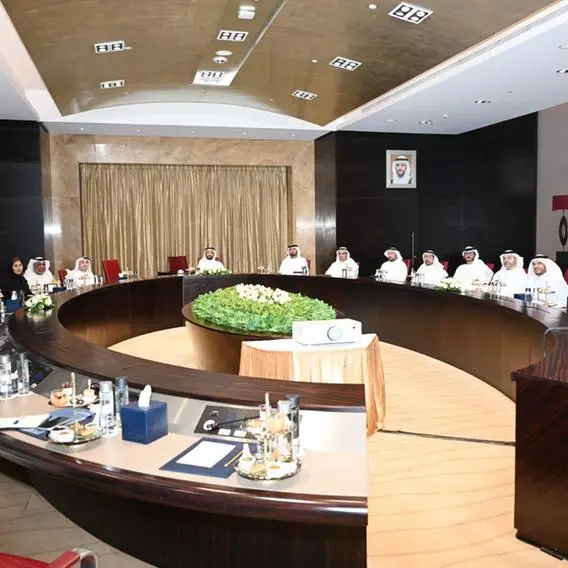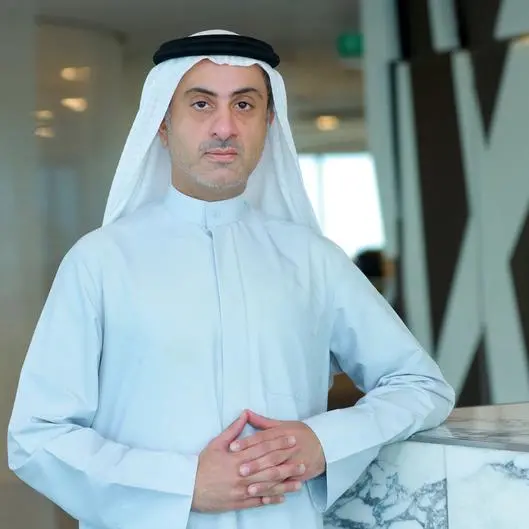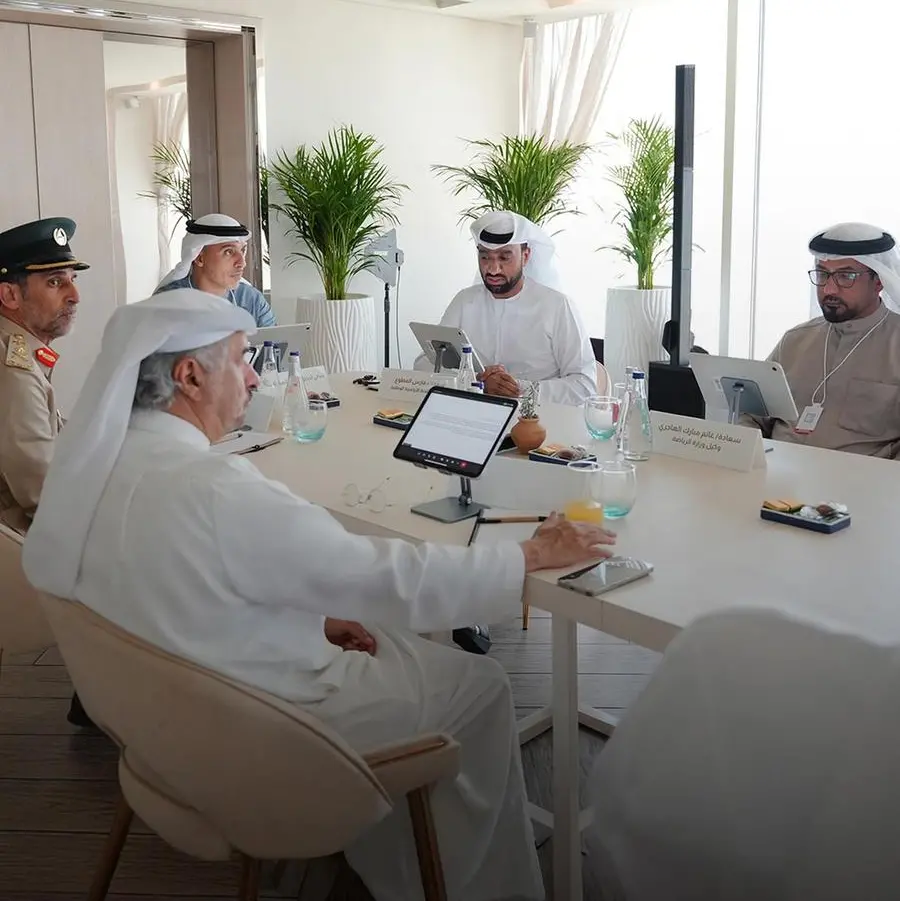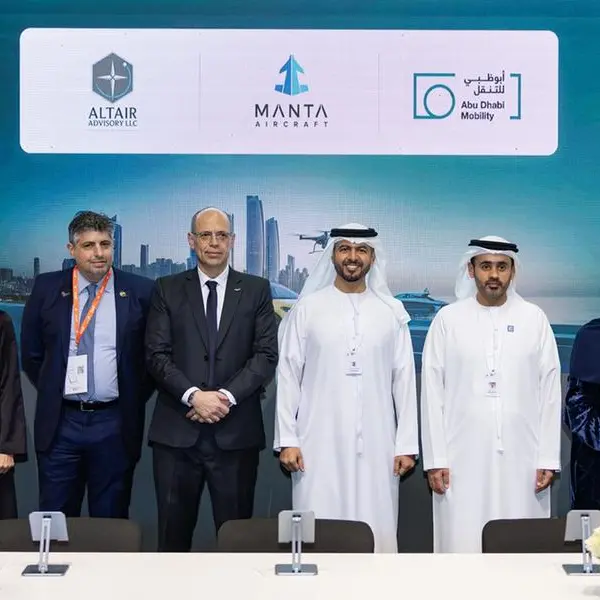PHOTO
- A US$10 billion investment fund has been allocated to accelerate the partnership objectives and will be managed by ADQ Holding
Abu Dhabi, UAE – The United Arab Emirates, the Arab Republic of Egypt and the Hashemite Kingdom of Jordan have announced an Industrial Partnership for Sustainable Economic Growth in Abu Dhabi today to unlock new industrial opportunities and enhance sustainable economic growth in the three countries, across 5 sectors.
His Highness Sheikh Mansour bin Zayed Al Nahyan, Deputy Prime Minister of the UAE and Minister of Presidential Affairs, witnessed the signing of the partnership, which is designed to achieve sustainable economic growth across food and agriculture, fertilizers, pharmaceuticals, textiles, minerals, and petrochemicals. In order to accelerate the partnership objectives, a US$10bn investment fund has been allocated and will be managed by ADQ Holding
H.E. Dr. Mostafa Madbouly, Prime Minister of Egypt, and H.E. Dr. Bisher Al Khasawneh, Prime Minister of Jordan, witnessed the signing alongside His Highness.
The partnership agreement was signed by H.E. Dr. Sultan Al Jaber, UAE Minister of Industry and Advanced Technology, H.E. Dr. Nevein Gamea, Egyptian Minister of Industry and Trade, and H.E. Yousef Al Shamali, Jordan Minister of Industry, Trade and Supply.
H.H. Sheikh Mansour bin Zayed Al Nahyan stated: “The partnership embodies the vision of His Highness Sheikh Mohamed bin Zayed Al Nahyan, President of the UAE, to enhance industrial integration with Arab nations and the rest of the world so we can achieve a major leap in the industrial sector and transform its potential an economic driver. Industry is the backbone of the world’s largest economies. Through its capabilities, effective policies and current focus on developing advanced technology and logistics infrastructure, we are confident that the UAE can build a global economic powerhouse by leveraging industrial partnerships across the region.”
H.H. Sheikh Mansour added: “Advancing the industrial sector in the UAE, Egypt and Jordan will help strengthen and diversify the economy in each nation and increase the contribution of industry to the national GDP. This partnership is also a testament to its signatories’ ability to strengthen their relations and introduce new projects and industries within an integrated industrial ecosystem, while unlocking promising opportunities for future generations.”
The three nations who are party to this partnership have diverse resources and unique competitive advantages, including access to raw materials. In particular, they enjoy robust capabilities in the pharmaceutical industries, with clear ambition to develop and expand them further and increase their production capacity. They also wish to strengthen manufacturing capabilities in the steel, aluminum, petrochemicals and derivatives sectors.
The three nations’ combined industrial capacity represents around 26% of the total industrial capacity of the MENA region. These countries also enjoy a highly developed logistical infrastructure, including airports, ports and strategic transport corridors such as the Suez Canal; major companies with distinct capabilities in the main focus areas of the partnership; and access to capital and smart financing solutions. Almost half the total population of the partner countries comprising 122 million people are young people, who represent both a large market and an emerging workforce.
His Excellency Dr. Bishr Al-Khasawneh delivered remarks at the signing ceremony highlighting that the partnership is a testament to the depth of the historic relationship between the 3 countries; emphasizing that that the partnership enhances integration, protects supply chains, empowers import substitution, and promotes sustainable economic development; all of which will result in economic growth, job creation and other benefits.
Dr. Al-Khasawneh thanked the leadership of the UAE for their efforts towards strengthening relations and economic cooperation in the region.
Al-Khasawneh said, "The continued active interaction and coordination at the leadership level confirms the strength of these relations with the industrial sector at the center of the partnership. In Jordan, an attractive investment destination, industry contributes to 24% of the GDP, and account for 21% of the countries employment. Jordan exports to many countries around the world and is empowered by supportive laws and regulations.
Jordan is eager to expand its global trade as the world recovers from the Covid 19 pandemic and continues to address global challenges.
For his part, Egyptian Prime Minister His Excellency Mostafa Madbouly thanked the leaders of Egypt, Jordan and the UAE for a significant partnership that embodies the depth of relations between the countries. He stressed that the support of the leadership in the three nations facilitated effective consultations and discussions between the stakeholders and specialists, resulting in the conclusion of these important agreements.
His Excellency Mostafa Madbouly said: “The pandemic and the Russian-Ukrainian crises revealed beyond any doubt the need for integration between our Arab countries in a way that helps achieve the interests of our peoples in Egypt, the UAE and Jordan and could become the seed for a stronger and broader cooperation.”
Dr. Madbouly stressed that the current regional and international conditions make it imperative for Arab countries to maximize opportunities for integration, especially since each country has its unique competitive advantage and its capabilities.
He added, “The projects that have been agreed upon will create an added value for the three countries and will have a positive impact on national security, local industry, and supply chain activities. There will be a continuous follow-up to the implementation of these projects, facilitating procedures, and overcoming obstacles. We aim to quickly reap the benefits of these projects, especially as the first phase achieves many gains in terms of enhancing food and drug security. The projects will also attract foreign investment and provide job opportunities for our youth.”
In his speech at the beginning of the signing ceremony, His Excellency Dr. Sultan bin Ahmed Al Jaber, UAE Minister of Industry and Advanced Technology, said: “In line with the directives of His Highness Sheikh Mohamed bin Zayed Al Nahyan, President of the United Arab Emirates, the Ministry of Industry and Advanced Technology focuses on developing and empowering the industrial sector, enhancing its contribution to the GDP and on economic diversification.”
He added, "We extend an open invitation to our partners to support this collaboration by encouraging private sector participation, enhancing advanced technology applications, providing smart financing solutions, and opening markets to encourage the growth of the industrial sector in these and other countries."
He continued: "In line with the directives of His Highness Sheikh Mohamed bin Zayed Al Nahyan, President of the UAE, and with the aim of accelerating the objectives of this partnership between the three nations, a US$10 billion investment fund has been allocated to accelerate the partnership objectives and will be managed by ADQ Holding.”
H.E Dr Al Jaber added: “This partnership will contribute to strengthening relations and cooperation with our brothers in Jordan and Egypt, and are in line with the goals of the Principles of the Fifty that were announced by the UAE with the aim of building a better future. Developing distinguished economic partnerships is one of the most important priorities of the UAE leadership and government. The partnership will help diversify our economies and promote growth by increasing the in-country value of industrial products, especially in priority industries such as petrochemicals, pharmaceuticals, agriculture, food, and others. Through collaboration across expertise and resources, we will be able to add industrial value and reduce production costs, create more jobs, and achieve positive results for all parties.”
He concluded: “This partnership reflects our efforts to build constructive development partnerships that enhance our national economies, promote sustainable economic growth, support the knowledge sharing, deepen integration of the unique advantages of each participating country, boost self-sufficiency, enhance food and health security, integrate value chains, and develop more joint industrial ventures.”
During his remarks, His Excellency Mohamed Hassan Al-Suwaidi, Managing Director and CEO of ADQ, said: "In line with the directives of His Highness Sheikh Mohamed bin Zayed, President of the United Arab Emirates, the US10billion investment fund allocated and managed by the Abu Dhabi Holding Company will catalyze the projects identified in this partnership across the agreed sectors and will strengthen the economic infrastructure in the 3 countries.
He added: "The allocation of this fund confirms ADQ's commitment to industrial investment, directly or through its portfolio of companies, to enhance and enable the partnership and achieve sustainable economic benefits for the three participating nations and their people and is aligned with our objective of solidifying the UAE and Abu Dhabi’s position as a leading global investment and partnership destination across various critical sectors; and particularly in the industrial sector.”
His Excellency Al-Suwaidi continued: "ADQ is committed to driving further investments and infrastructure, specifically in the industrial sectors agreed to in this partnership, which are of vital importance and will enhance the industrial GDP contribution for all three countries and result in significant positive impact on their efforts of economic diversification and development as well as job creation in the years to come.”
Industry is the backbone of economy
The partnership is based on enhancing investment opportunities in each country’s industrial sector, developing the three nations’ human and natural capital, and exploring a collective consumer market that offers opportunities for both the local private sector and international investors. The partnership includes launching joint industrial projects between the countries to promote economic growth and industrial integration, achieve self-sufficiency, and integrate value chains across the UAE, Egypt and Jordan.
Regional and Global Industrial Partnerships
The Integrated Industrial Partnership For Sustainable Economic Growth reflects the UAE’s commitment to creating key partnerships at the regional and global levels, especially in the industrial sector. This is in line with its vision to enhance the industrial sector’s role in the national economy, integrate advanced technology, and utilize the competitive advantages and capabilities of each country. This makes the UAE a leading global destination for the industries of the future and a hub that attracts the most prominent industries. The UAE is a launching pad for industrial investors targeting global markets due to its advanced logistical services and infrastructure, modern transportation networks, and the availability of raw materials. Taken together, these ensure supply-chain flexibility in, increase sustainable economic growth, and enhance value-added industries.
The partnership also embodies the close relations between the three countries, their common vision and mutual trust. This partnership provides a platform for cooperation in the future, and is based on the importance of integration and openness, and the shared commitment to developing the industrial sector, exchanging economic benefits, and utilizing human resources and experiences through the establishment of major joint industrial projects in more than one country.
Five Key Sectors
Agriculture, Food and Fertilizers
Food security is a key objective of this partnership. The participating countries possess all the key elements across the food value chain to scale up investment in fertilizers, cereal, animal protein, and food production capacity. The UAE, Egypt and Jordan have the required combination of renewables and mineral resources to produce the basic materials to ensure sustainable development. Egypt, for instance, enjoys a global leading position as a producer and processor of food and agricultural processes that can meet the growing needs of the populations. The Jordan Valley is blessed with diversity of agricultural areas, bio-climatic and environmental conditions, and a variety of agricultural products with high technical specifications, thanks to the application of modern production technology. The innovative technologies, fertilizer components and basic plastic products available in the UAE will be harnessed in agriculture and irrigation, with recent cross-border transactions reflecting these sectors’ growing strength and influence.
The value of the agricultural and food products market in the three countries was estimated at US$52 billion in 2019, with an annual growth rate of 11 percent. The value of imports such as wheat, fodder, fruits, vegetables, meat and fish reached US$37 billion in 2019.
There are opportunities for promising projects to increase fertilizer production and agriculture, especially wheat and corn, and feed production to meet the growth needs in the dairy, meat, poultry, food processing and food packaging sectors. The value of wheat and corn imports for the three countries reaches US$5.8 billion annually (21 million tons), which represents a great opportunity to increase production. Wheat and maize increased from 16.5 million tons to about 30 million tons annually to meet demand, and the value of meat and fish imports amounted to US$4.9 billion (1.8 million tons).
The three countries also have a high potential in fertilizer production, estimated at 7.6 million tons annually, which offers an important platform for expansion projects in fertilizer production to meet the increasing demand.
Pharmaceuticals
The UAE, Egypt and Jordan are amongst the largest drug manufacturing centers in the region, with more than 200 pharmaceutical factories and exports to 90 countries worth more than US$1 billion. The value of the pharmaceutical market in these countries is estimated at US$9 billion, with an annual growth rate of 7 percent. The value of the pharmaceutical market of imports reached US$5 billion in 2019.
The industry is characterized by skilled labor, innovation, and high regulatory and production standards. The partnership will leverage the UAE’s chemical inputs, its manufacturing capabilities and storage and distribution facilities. It will also capitalize on Egypt’s pharmaceutical mega projects to build the largest pharma manufacturing center in MENA, in addition to leveraging Egypt’s considerable market size and access to a large pool of trained doctors, pharmacists, engineers and skilled technicians.
Jordan has a significant expertise in areas such as small molecule manufacturing, in addition to its global competitiveness and reach, with its products reaching 90 countries across the globe. The partnership also seeks to benefit from the increasing development of the UAE in the pharmaceutical sector, which exports medicines to 48 countries.
There are opportunities for projects in medicines estimated at about US$5 billion, especially in the field of producing alternative medicines and manufacturing active ingredients for medicines (raw materials).
Clothing and Textiles
The textile industry across the three countries is worth US$5 billion today. Collectively, they supply some of the leading global brands with high-quality fabrics and finished garments. All three countries bring inherent strengths across the value chain to create substantial economic opportunities.
Egypt brings a vertically integrated textile sector, leveraging competitive labor cost and skills, extensive fabric and garment facilities, a strategic location and exports equivalent to 300,000-plus tons of cloth and apparel annually. Jordan has a competitive export-oriented finished garment sector, benefitting from numerous free-trade agreements with various countries including the US. The UAE is well positioned to provide competitive raw materials to support the scaling up of fabric manufacturing in both Egypt and Jordan. Additionally, it also has ready access to large regional markets, such as India with which it recently signed a Comprehensive Economic Partnership Agreement.
The value of clothing and textile imports for the three countries amounts to about US$9 billion annually, which provides significant opportunities for new projects, especially in the polyester industry, whose imports amount to more than US$600 million.
Petrochemicals
Petrochemicals are key enablers for the agriculture, food, fertilizer, textile, pharmaceutical and other sectors. In 2019, the combined contribution of the petrochemical industry to GDP in the UAE, Egypt and Jordan exceeded US$16 billion. The three countries have access to a range of energy sources, especially natural gas, which is estimated at about 278 trillion cubic feet, in addition to advanced capabilities in the field of petrochemical production and derivatives, which are estimated at about 20 million tons per year. This paves the way for expansion projects in the petrochemical sector and manufacturing industries which could exceed US$21 billion.
Metals
The three countries have abundant sources of metals that will make an important contribution to value-added products. The value of the iron, aluminum, metal and steel market in the three countries is estimated at US$13 billion, with an annual growth rate of 2 percent.
Egypt and Jordan also have large reserves of high-quality silica, which is the building block for many manufacturing industries, providing a platform for higher value-added industries. For its part, the UAE is one of the world's five largest aluminum producers, benefiting from its access to bauxite ore, competitive and sustainable energy sources, and advanced technology. There are opportunities in the metals sector (aluminum, iron, silica and potash) for projects worth US$23 billion by using these materials to manufacture higher value products such as glass, electrical wires, car components, solar panels and microelectronic chips.
Supreme Committee and Executive Committee
Under the partnership, a tripartite supreme committee, headed by the signing ministers, will be established. In addition, there will be an executive committee composed of undersecretaries of the ministries and representatives from relevant authorities and sectors. This committee will work with the private sector to increase opportunities, and the participating nations will identify the stakeholders and the courses of action required to achieve the objectives of these partnerships. The committee will also review achieved progress, facilitate and supervise cooperation, and consider next steps and new projects of the strategic economic partnership. It will accelerate the introduction of economically viable opportunities and coordinate the pool of private-sector participants.
Cooperative economic relations between the three countries are of great importance. For example, the UAE Holding Company (ADQ) has invested in two Egyptian companies: MOPCO (US$266 million) and Abu Qir Fertilizers (US$391 million). ADQ also invested in the Commercial International Bank Egypt with a value of US$987 million, and in the Alexandria Container and Cargo Handling Company (US$186 million) with the aim of developing the river transport system and establishing ports.
The UAE’s investments in Jordan exceed US$17 billion, and are targeted primarily at infrastructure, transportation, tourism, agriculture, industry and renewable energy. Jordan's investment in the UAE amounts to US$2 billion, mostly in the real estate sector. There is also a joint economic, commercial and investment program between the UAE and Jordan that includes business incubators, non-oil trade exchange, investment projects, and joint projects in financial technology, health and agriculture.
Essential industrial exports
The UAE's main exports are oil and gas, plastics, rubber, foodstuffs, chemical industries, metal industries, and building materials. Egypt exports gold, gas, electrical wiring, iron, textiles, and citrus fruits, while Jordan’s principal exports are phosphates, potassium fertilizers, medicines and metals.
Strong economies and booming industries
The economies and industries of the three countries represent a unique model in the region. The industrial sector in Jordan is a key partner in the nation’s economic plans. Work is being done to develop and implement economic policies that will contribute to strengthening the Jordanian industrial sector, enabling it to access regional and international markets and enhancing its contribution to sustainable economic development.
This sector contributes 25 percent to the GDP and ranks first among Arab countries, with its annual production amounting to US$25 billion dollars. The industrial sector employs about 250,000 workers in 17,000 establishments. The exports of the industrial sector amounted to 8 billion dollars, while industrial exports constitute 93 percent of the total national exports. Jordanian exports reach more than 140 countries around the world, and the average annual growth rate of the industrial sector’s exports during the past decade was 2.3 percent. Industry accounted for 80 percent of the flow of foreign direct investment to Jordan in the past decade.
Jordan produces a variety of products within various manufacturing industries, the most important of which are the pharmaceutical, chemical, clothing, engineering and food sectors. Jordan also has the fifth largest reserves of phosphate in the world. It is the world's seventh largest producer of potash, and has unique Dead Sea products. The investment in silica sand in Jordan is an attractive opportunity due to its quality, purity, and availability in abundant quantities. Silica is used in a number of industries such as glass, solar cells and technological products. If technological investments are made available, it will contribute to building advanced and competitive industries, given that Jordan's reserve of silica sand exceeds 20 billion tons.
The contribution of the industrial sector to the GDP in the UAE has increased to US$40.8 billion, and industrial exports exceeded US$31.6 billion, an increase of more than 50 percent compared to 2019. More than 220 new industrial production units were licensed; US$11.3 billion was directed back into the UAE market through the National In-Country Value Program. The UAE jumped five places in the UNIDO Competitive Industrial Performance Index based on the contribution of the industrial sector to the national GDP.
The UAE has an advanced industrial ecosystem with a diversified mix of energy, advanced digital infrastructure, world-class information and communication technology. It also has a distinguished geographical location that connects peoples with each other within eight hours of flying, and a logistical infrastructure consisting of 10 civil airports and 12 ports with annual handling capacity of 80 million tons. The UAE also ranks highly in terms of ease of doing business, quality of life, and political and economic stability.
As for Egypt's industrial sector, the country’s GDP reached US$394.3 billion in 2021, while the increase in GDP per capita totaled 6.8 percent. Egypt’s economy achieved 9 percent growth in the first half of the 2021/2022 fiscal year. The value of industrial output stands at US$52.7 billion (2020/2021), which represents around 15 percent of national GDP.
The total value of investments ins industry amounted to US$2.6 billion (2020/2021), which represents around 5.9 percent of all public investments. The value of export goods reached US$34.32 billion (2021), which reflects a 27 percent increase on 2020.
Egypt is home to a diversified industrial base that comprises more than 120 industrial zones across the country. It also offers an ecosystem of specialized industrial facilities that includes 17 industrial complexes across 15 governorates and 5,046 industrial units that provide around 48,000 direct job opportunities.
The Emirati-Egyptian-Jordanian industrial partnership establishes a new developmental launch towards future prospects in the industrial sector supported by advanced technology. The combined capacity of the three countries constitutes about 22 percent of the gross domestic product of the Middle East and North Africa, worth about US$765 billion according to World Bank statistics in 2019. The trade bloc of the three countries ranks 14th in terms of the value of exports to the world, which stand at US$419 billion, while imports total US$380 billion, which represents substantial opportunities for the growth of manufacturing integrated products in the three countries.
From the UAE side, the signing ceremony was attended by: H.E. Sarah Al Amiri, UAE Minister of State for Public Education and Future Technology; and H.E. Dr. Thani Al Zeyoudi, UAE Minister of State for Foreign Trade. They were joined by numerous officials, including: H.E. Mohamed Al Shorafa Al Hammadi, Chairman of the Department of Economic Development – Abu Dhabi; Her Excellency Maryam Al Kaabi, UAE Ambassador to Egypt; H.E. Omar Suwaina Al Suwaidi, Undersecretary at the Ministry of Industry and Advanced Technology (MoIAT); H.E. Mohamed Hassan Alsuwaidi, CEO of ADQ; H.E. Abdullah Mohamed Al Mazrui, Chairman of the Federation of the UAE Chamber of Commerce and Industry; Mr. Mohammed Saif Al Suwaidi, Director General of Abu Dhabi Fund for Development; Khaled Salmeen is the Executive Director of Downstream Industry, Marketing and Trading at the Abu Dhabi National Oil Company (ADNOC); His Excellency Khadim Al Darei, Chairman of the Egyptian-UAE Business Council; His Excellency Jamal Saif Al Jarwan, Secretary General of UAE International Investors Council; and Ahmed Mohamed Al Naqbi, CEO of Emirates Development Bank.
Also in attendance were H.E. Abdullah Al Shamsi, Assistant Undersecretary for Industry Growth at MoIAT; H.E. Osama Amir Fadhel, Assistant Undersecretary for Industry Accelerators at MoIAT; alongside a number of experts and specialists in the industrial and manufacturing sector.
From Egypt’s side, the ceremony was attended by His Excellency Al-Sayed Al Quseir, Minister of Agriculture and Land Reclamation; Her Excellency Dr. Hala Al-Saeed, Minister of Planning and Economic Development; Dr. Tamer Essam, Chairman of the Egyptian Drug Authority; Counselor Mohamed Abdel-Wahab, CEO of the General Authority for Investment; Engineer Ayman Al-Suwaidi, Chairman of the Federation of Egyptian Industries; Ayman Soliman, CEO of the Sovereign Fund of Egypt, and a number of officials.
From Jordan’s side, the signing was attended by Dana Al-Zoubi, Secretary-General of the Ministry of Industry, Trade and Supply; Zaher Al-Qatarneh, Secretary-General of the Ministry of Investment; Kholoud Al-Saqqaf, CEO and Vice-Chairman of the Social Security Investment Fund; His Excellency Nassar Al-Habashneh, Jordan’s Ambassador to the UAE, in addition to the Chairman of the Chamber of Industry, Chairman of the Chamber of Commerce, Chairman of Amman’s Chamber of Commerce, Chairman of Amman’s Chamber of Industry, and a number of officials.
-Ends-
About the Ministry of Industry and Advanced Technology
The UAE’s Ministry of Industry and Advanced Technology (MoIAT), established in July 2020, is mandated with strengthening the UAE’s industrial sector, specifically by accelerating the adoption of advanced technologies and Fourth Industrial Revolution (4IR) solutions across the value chain.
MoIAT has three overarching goals: Strengthening the UAE’s industrial base, ensuring in country value, and raising the competitiveness of local industries. By enhancing the contribution of advanced technology, the Ministry will support the country’s sustainable economic growth, and ensure GDP contribution from the industry sector.
The Ministry will draft policies, laws and programs to create a world-class industrial development framework for the nation that will help attract foreign direct investment, boost In-Country Value creation, support national entrepreneurship, drive job creation, and boost exports of ‘Made in UAE’ products.
From encouraging the establishment of industrial complexes to raising local capacity in advanced technology, the Ministry will accelerate industrial development in a bid to drive economic growth, diversification, value retention and national self-reliance.
For more information, please contact MoIAT’s team at: Media@moiat.gov.ae
